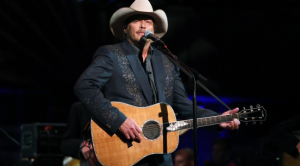
Released in 1991, this now-classic country anthem is more than just a catchy tune; it’s a cultural touchstone and a declaration of love for a specific brand of country music. To understand the song’s impact, we need to rewind a bit.
The late 1980s and early 1990s were a period of significant change in country music. The genre, once dominated by the likes of George Jones and Waylon Jennings, was starting to embrace a smoother, more pop-influenced sound. Singers like Garth Brooks were introducing a rock and roll energy, and some worried that the heart of country music – its storytelling and traditional instrumentation – was being lost.
Background
Enter Alan Jackson, a young artist with a deep respect for country music’s history. “Don’t Rock the Jukebox” wasn’t just a song; it was a statement of purpose. Jackson, with his signature baritone and down-home charm, tells a story about a bar where the jukebox keeps churning out modern country hits, leaving him and his friends yearning for the classics. He name-checks legends like Hank Williams and Johnny Cash, implicitly criticizing the current state of the genre.
The lyrics are full of vivid imagery, painting a picture of a smoky bar filled with characters seeking solace in the familiar sounds of traditional country. Lines like “Ain’t lookin’ for nothin’ fancy, just a little twang in my ear” and “We just want some steel guitar cryin’ and a heartache we can all share” resonate deeply with fans who felt the genre was losing its authenticity.
“Don’t Rock the Jukebox” wasn’t just a hit song; it became an anthem for a generation of country music traditionalists. It resonated with listeners who felt a disconnect between the new sounds and the music they grew up loving. The song topped the Billboard Hot Country Singles & Tracks charts and even won an ASCAP Award for Country Song of the Year in 1992. It solidified Alan Jackson’s place as a champion of traditional country music and helped pave the way for a resurgence of interest in the genre’s roots.
But the song’s legacy goes beyond its chart success. “Don’t Rock the Jukebox” sparked a conversation about the evolution of country music, a conversation that continues to this day. It’s a reminder that music is a living art form, constantly evolving while still holding onto its core identity. And for those who cherish the sound of a steel guitar and a heartfelt ballad, “Don’t Rock the Jukebox” remains a timeless ode to the music that touched their souls.